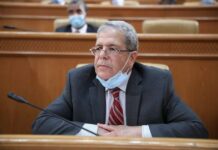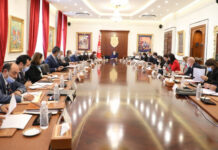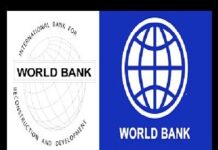With a chapter of the 2014 Constitution, the President of the Republic, with limited powers, changed the features of the country’s political system and landscape. Chapter 80, described as president Kais Saied’s rocket, on which he built his project by freezing parliament and changing most of the doors of the constitution.
Who voted for Article 80? How did the National Constituent Assembly put it?
“The President of the Republic is in grave danger to the national being, the security and independence of the country, so that it is not possible for the normal functioning of the State to take the measures necessitated by that exceptional situation, after consulting the Prime Minister and the Speaker of the People’s Assembly and announcing the measures in a statement to the people.
These measures must aim to ensure the return of normal state patrols as soon as possible, and the People’s Assembly is considered to be in permanent session throughout this period. In this case, the President of the Republic may dissolve the People’s Assembly and a blame list may be filed against the Government.
Thirty days after these measures take effect, and all the time thereafter, the Constitutional Court is entrusted with the request of the Speaker of the People’s Assembly or 30 of its members to decide whether or not the exceptional situation will continue. The Court publicly declares its decision within a maximum of 15 days. These measures are terminated with the disappearance of their causes. The President of the Republic makes a statement to the people.”
In this form, Chapter 80, which holds the number 79 in the draft constitution, was introduced by the National Constituent Assembly, which had the majority of its seats, in its debate on January 12, 2014, and ratified on January 20, 2014. This chapter contained two amendment proposals, one of which was from the Consensus Committee, which provided for the change of the first paragraph by “the President of the Republic in the event of a serious threat to the national being, security or independence of the country, making it impossible to normally proceed with the state’s wheels . . .
A second amendment proposal was also received by Representatives Rim Mahjoub and Sahbi Atig , which provides for the revision of the last paragraph to be drafted to “end the work of these measures with the disappearance of their causes or by a decision of the Constitutional Court and the President of the Republic makes a statement to the people”.
According to Habib Khader, the constitution’s general rapporteur in writing the 2011-2014 “Central Texts of the Tunisian State”, the ratification of this controversial chapter came on Jan. 20 with the approval of 172 deputies without retaining and opposing a single deputy.
Referring to the deliberations of the National Constituent Assembly, it is clear that the mp for the Democratic Alliance Bloc, the Progressive Democratic Party, Shukri al-Qastali, had an opinion against the original text.
“Just as the provisional organization of the authorities has been exposed to such an explanatory situation, it must be clarified what the imminent danger means? What’s its quality? Is it a civil war? Is it a chemical attack, a germ war or an environmental disaster? I mean, we give some clarifications about this danger and I suggest “such as the state of civil war or the country being attacked externally or a natural or environmental disaster. Such as declaring a ban on the Golan and establishing a state of emergency …
Translated by Rifi-JDD











